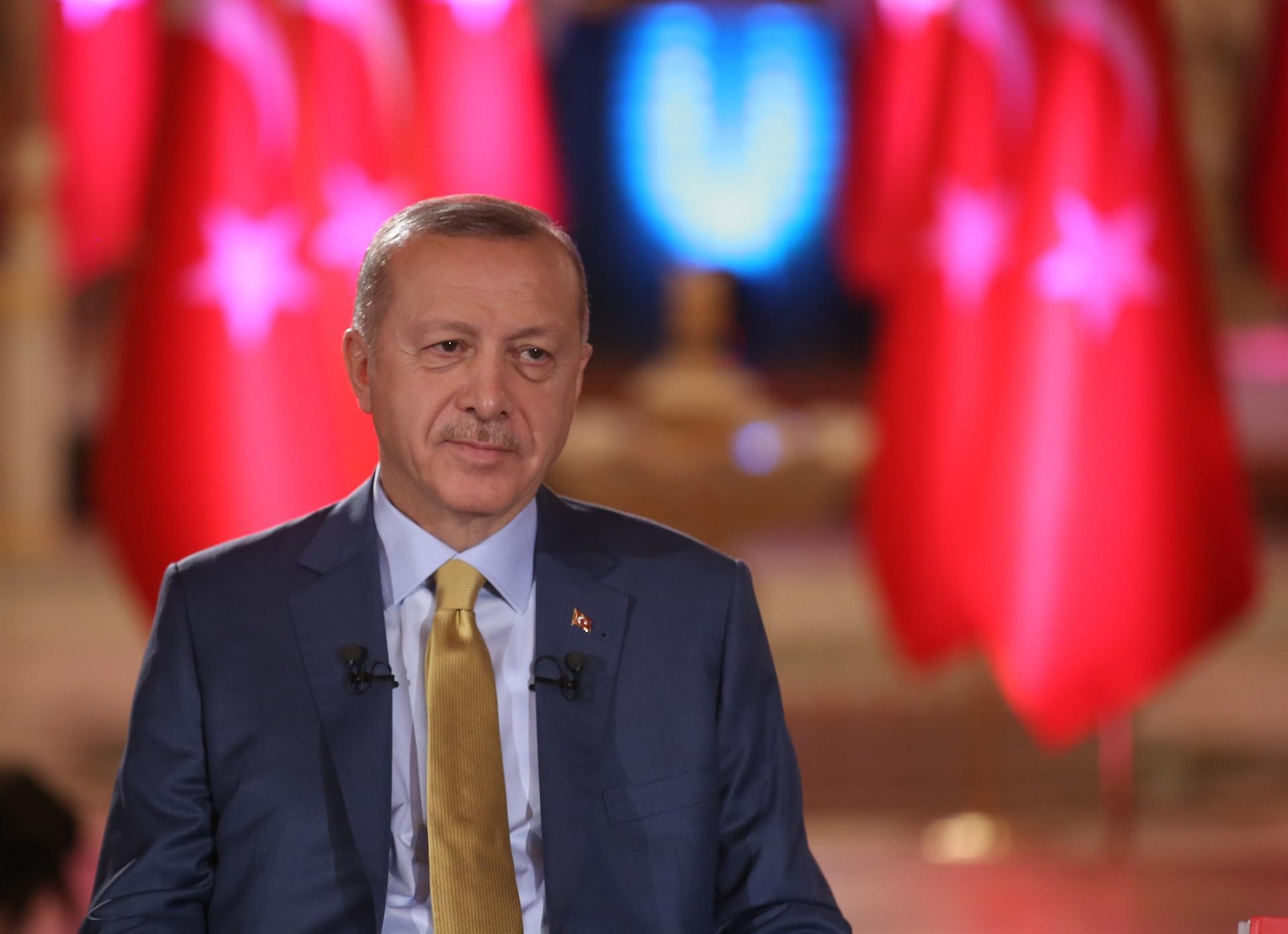
With the maritime deal between Turkey and Libya, Ankara has shown the world its determination to protect its rights under international law, Turkey’s President Recep Tayyip Erdoğan said on Dec. 9.
Erdoğan was speaking at a live televised interview with TRT, country’s public broadcaster.
On Nov. 27, Turkey and Libya’s U.N.-recognized Government of National Accord (GNA) in Tripoli signed the bilateral memorandum.
The memorandum asserts Turkey’s rights in the Eastern Mediterranean in the face of unilateral drilling by the Greek Cypriot administration, clarifying that the Turkish Republic of Northern Cyprus (TRNC) also has rights to the resources in the area.
Noting that Turkey has the longest coastline in the Eastern Mediterranean, Erdoğan said: “With this deal, we have taken a rightful step within the framework of international law against the approaches tried to be imposed by Greece and the Greek Cypriot administration and the claims of maritime jurisdictions aiming to confine our country to the Gulf of Antalya.”
Erdoğan recalled that a step was taken on the issue long ago, but it could not be proceeded due to then Libyan leader Muammar Gaddafi’s death.
Since 2011, when longtime ruler Gaddafi was ousted and killed, Libya has seen the emergence of two rival seats of power: one in eastern Libya, to which military commander Khalifa Haftar is affiliated, and the Government of National Accord, which enjoys U.N. recognition.
Erdoğan also said that some countries were disturbed by the deal, while similar deals were inked by Greek Cypriot administration, Egypt, Lebanon and Israel in the past 20 years, ignoring Turkey’s rights and international law in the Eastern Mediterranean.
Speaking about Turkey’s exploration and drilling activities in there, Erdoğan said that his country is set to buy another drill ship and that the country will carry on its activities not only in Mediterranean but also in Black Sea and “maybe even” in international waters.
Turkey currently has two drilling and two seismic exploration ships, he added.
“Other international actors cannot conduct exploration activities in the areas marked in the memorandum.
“Greek Cypriots, Egypt, Greece and Israel cannot establish a natural gas transmission line without Turkey’s consent,” he added.
To a question about a possible military assistance call from Libya’s GNA, Erdoğan said such a call from the Tripoli-based government, and Libyan nation gives Turkey that right to answer the call.
“In case of such an invitation, Turkey will decide itself about what kind of initiative to undertake,” Erdoğan said.
He also noted that Russia, the UAE and Egypt were violating the UN embargo on arms sales to Libya by providing military assistance to Haftar forces in the country.
On Russia’s approach to Libya, Erdoğan said he wants to have a phone call with Russian counterpart Vladimir Putin within a week to talk about the issue.
He noted that any support given to Haftar is illegal just like his forces.
Erdoğan also said Putin will visit Istanbul on Jan. 8 and they will inaugurate the TurkStream project.
The TurkStream natural gas pipeline has a total capacity of 31.5 billion cubic meters, out of which the first line will carry a capacity of 15.75 billion cubic meters of Russian gas to Turkish consumers. The second line will carry another 15.75 billion cubic meters of gas to Europe via Turkey.
Safe zone in northern Syria
Turkey aims to settle one million Syrian war refugees in the area of northern Syria where it carried out a military operation in October, Erdoğan said.
“The Turkish nation can carry out an exemplary step between Ras al Ain and Tel Abyad,” he added.
“Settling one million people between Tel Abyad and Ras al Ain, that is our aim in the safe zone, that is our plan,” he added, holding up a map of the region with marks on it.
Erdoğan also said that Ankara would finance the resettlement on its own if allies did not provide support.
Turkey and its Syrian opposition allies launched the offensive against the YPG, which Ankara views as the Syrian offshoot of the outlawed PKK.
After seizing a strip of land inside Syria 120 kilometers long and around 30 kilometers wide running from the town of Ras al Ain to Tel Abyad, Turkey signed separate deals with the United States and Russia to halt its operation.
Turkey had previously said it could settle 2 million Syrian refugees in a 444-kilometer-long “safe zone” it aimed to form in northeastern Syria and repeatedly urged NATO allies to provide financial aid for the plans.
Turkey currently hosts more than 3.5 million refugees from neighboring Syria’s civil war which started in 2011 after peaceful protests against the Bashar al-Assad regime morphed into a bloody war.
Erdoğan met his German, French and British counterparts on the sidelines of a NATO summit in London on Dec. 3-4 to hold talks on developments in Syria and his “safe zone” plan.
After the summit, Erdoğan said one country, which he did not name, had pledged support for the plan but that Germany, France and Britain had not done so. He had previously said that Qatar could back it.
The European Union and Turkey’s allies in NATO have rejected its calls for financial assistance and condemned the Turkish offensive, which they said might hinder the fight against ISIL in Syria.
Erdoğan said both deals reached separately with Russia and the United States have failed to yield the expected result.
Under the deals, Turkey paused “Operation Peace Spring” to allow the withdrawal of the YPG from a planned Syrian safe zone.
The operation was launched to eliminate the YPG from northern Syria east of the Euphrates River in order to secure Turkey’s borders, aid in the safe return of Syrian refugees and ensure Syria’s territorial integrity.
The PKK is listed as a terrorist organization by Turkey, the United States and the European Union.